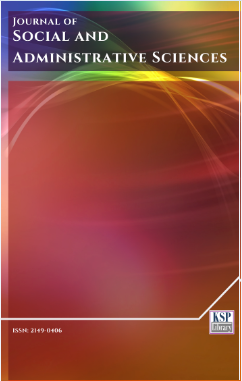An Analysis of the Factors Affecting Turnover Intensions: Evidence from Private Sector Universities of Peshawar
Abstract
Abstract. High rate of turnover is one of major problems relevant to human resource management in private sector universities in Pakistan. It is on one hand, depriving the universities from talented and qualified labour force, and on the other hand, affecting the education standard of these universities. The present study was carried out to explore the inter relationship among the job satisfaction and turnover intentions and factors affecting them. Primary data was used for this purpose. The data was collected from a sample 150 employees of private sector universities of Peshawar. In the results, Job satisfaction and promotion opportunities appeared as significant factor affecting turnover intentions. It is recommended for the private sector universities on the basis of results of the study to give competitive salaries to the staff, increase promotion opportunities, improve leave policy, financial rewards, and make the system transparent and justified.
Keywords. Turnover Intensions, Private Sector Universities, Peshawar.
JEL. M10, M19, M52.
References
Ahmad, T., & Adnan. R. (2011). Factors affecting turn-over Intentions of doctors in public sector medical colleges and hospitals. Interdisciplinary, Journal of Research in Business, 1(10), 57-66.
Ahmed, B., Ikramullah.S., Raheel, M. & Zaighum. T. (2012). Organizational ethics and job satisfaction: Evidence from Pakistan. African Journal of Business Management, 6(8), 2966-2973. doi: 10.5897/AJBM11.2107
Adenguga, R.A., Titilola, F.A., & Kolawole. O.A. (2013). Organizational commitment and turnover intention among private universities’ employees in Ogun State, Nigeria. Open Journal of Education, 1(2), 31-36. doi: 10.12966/oje.05.04.2013
Bushra, A., (2012). Job satisfaction and women’s turnover intentions in Pakistan’s Public Universities. The Lahore Journal of Business, 1(1), 59–77.
Hugh, A.J., & Feldman, D.C. (1982). A multivariate analysis of the determinants of job turnover. Journal of Applied Psychology, 67(3),350-360.
Hunjra, A.I., Muhammad, I.C., Aslam, S., Azam, M., & Rehman, K.U. (2010). Factors effecting job satisfaction of employees in Pakistani banking sector. African Journal of Business Management, 4(10), 2157-2163.
Joarder, M.H.R., Mohmad, Y.S., & Kawser. A. (2011). Mediating role of affective commitment in HRM practices and turnover intention relationship: A study in a developing context. Business and Economics Research Journal, 2(4), 135-158.
Kaplan, D., (2009). Determinants of job satisfaction and turnover among physicians. A Dissertation submitted to San Jose State UniversityIn Partial Fulfillment of the Requirements for the Degree Master of Science.
Khatri, N., & Fern, C.T. (2001). Explaining employee turnover in an Asian context. Human Resource Management Journal, 11(1), 54-74. doi: 10.1111/j.1748-8583.2001.tb00032.x
Kitteruengcharn, N. (1997). Impacts of Job and Organizational Satisfaction and Commitmenton Turnover Intentions in Thai Public Sector Engineers. A thesis submitted to Concordea University Canada for partial fullfillment of the degress of Master of Scince in Adminstration.
Korunka, C., Hoonakker, P.L.T. & Carayon, P. (2005). A Universal Turnover Model for the IT Work Force - A Replication Study.HumanFactors in Organizational Design and Management - VIII
Mehboob, F., & Niaz.A. B. (2012). Job Satisfaction as a Predictor of Organizational Citizenship Behavior: AStudy of Faculty Members at Business Institutes. Interdisciplinary Journal of Contemporary Research in Business, Institute of Interdisciplinary Business Research, 3(9), 153-165.
Mobley, W.H., Horner, S.O, & Hollingsworth, A.T (1978). An evaluation of precursorsof hospital employee Turnover. Journal of Applied Psychology, 63(4), 408-414,
Mowday, R.T., Steers, R.M., & Porter, L.W. (1979). The measurement of organizational Commitment, Journal of Vocational Behaviour, 14, 224-247. doi: 10.1016/0001-8791(79)90072-1
Nor, N.N.B.M. (2012). Turnover Intention: An Examination of Job Characteristics and Transactional Leadership Style Among operators in electrical and electronics Sub-sector. Thesis Submitted to Othman Yeop Abdullah Graduate School of BusinessUniversiti Utara Malaysia in Fulfilment of the Requirement for the Degree of Master of Science (Management).
Price, J.L. (1977). The study of turnover. 1st edition, Iowa State University Pres.
Rahman, A, S., Naqvi, M.M.,& Ramay, M.I. (2008). Measuring turnover intention: A study of IT professionals in Pakistan. InternationalReview of Business Research Papers, 4(3), 45-55.
Sarminah, S. (2006). The contribution of demographic variables: Job characteristics and Job satisfaction on turnover intentions. Journal ofInternational Management Studies, 1(1). 125-135.
Yin-Fah, B.C., Yeoh. S.F., & Syuhaily, O. (2010). An exploratory study on turnover intention among private sector employees. International Journal of Business and Management, 5(8), 57-60. doi: 10.5539/ijbm.v5n8p57
Yucel, I. (2011). Examining the relationships among Job satisfaction, organizational commitment, and turnover intention: An empirical study. International Journal of Business and Management, 7(20), 44-54. doi: 10.5539/ijbm.v7n20p44
DOI: http://dx.doi.org/10.1453/jsas.v2i3.403
Refbacks
- There are currently no refbacks.
....................................................................................................................................................................................................................................................................................................................................... Journal of Social and Administrative Sciences - J. Adm. Soc. Sci. - JSAS - www.kspjournals.org
ISSN: 2149-0406
Editor: editor-jsas@kspjournals.org Secretarial: secretarial@kspjournals.org Istanbul - Turkey.
Copyright © KSP Library




